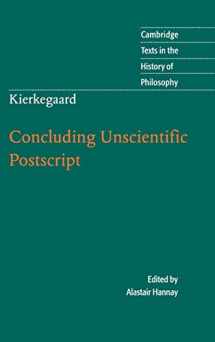
Kierkegaard: Concluding Unscientific Postscript (Cambridge Texts in the History of Philosophy)
Book details
Summary
Description
Kierkegaard's Concluding Unscientific Postscript is a classic of existential literature. It concludes the first and richest phase of Kierkegaard's pseudonymous authorship and is the text that philosophers look to first when attempting to define Kierkegaard's own philosophy. Familiar Kierkegaardian themes are introduced in the work, including truth as subjectivity, indirect communication, the leap, and the impossibility of forming a philosophical system for human existence. The Postscript sums up the aims of the preceding pseudonymous works and opens the way to the next part of Kierkegaard's increasingly tempestuous life: it can thus be seen as a cornerstone of his philosophical thought. This volume offers the work in a new and accessible translation by Alastair Hannay, together with an introduction that sets the work in its philosophical and historical contexts.


We would LOVE it if you could help us and other readers by reviewing the book
Book review



